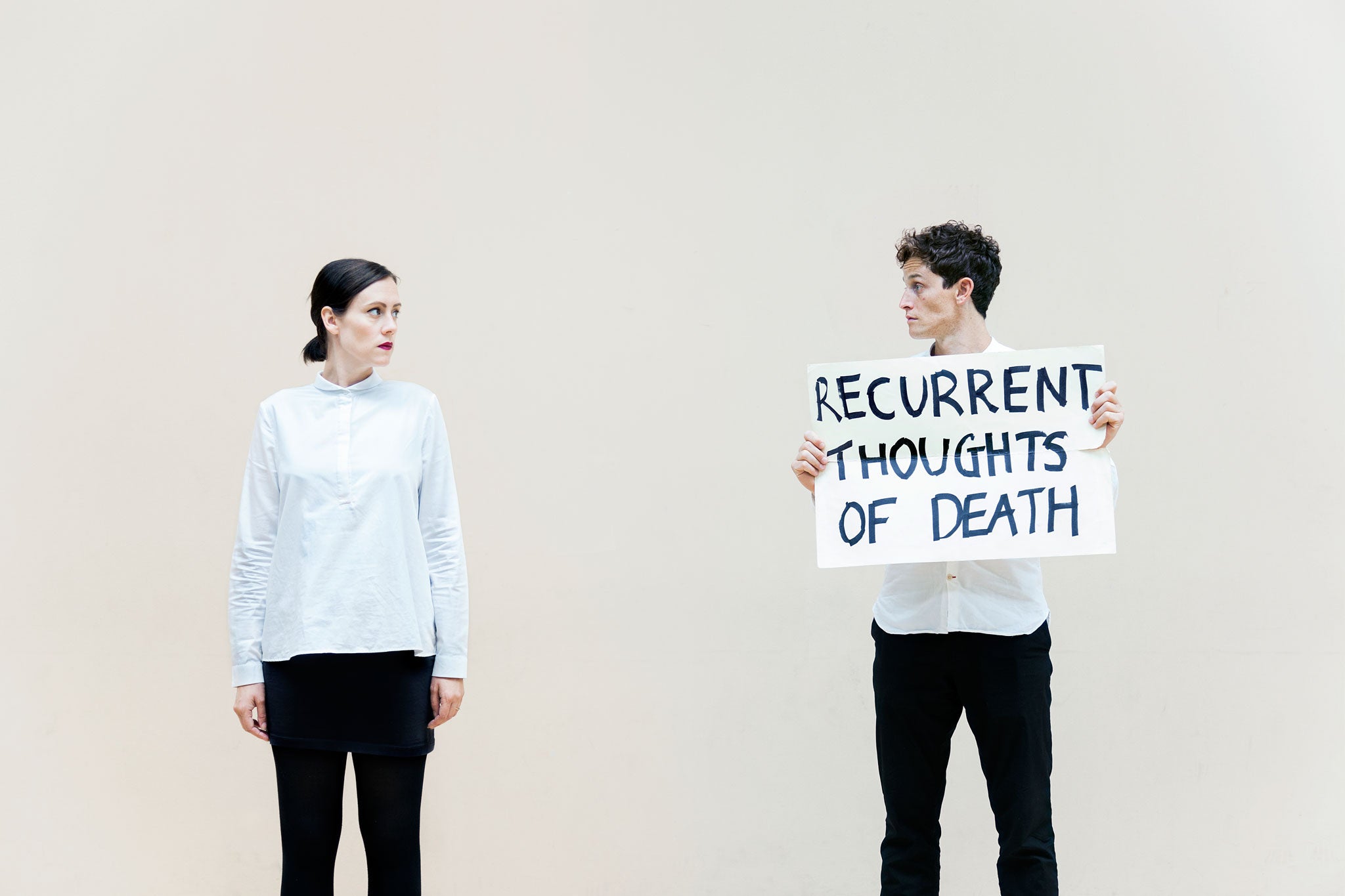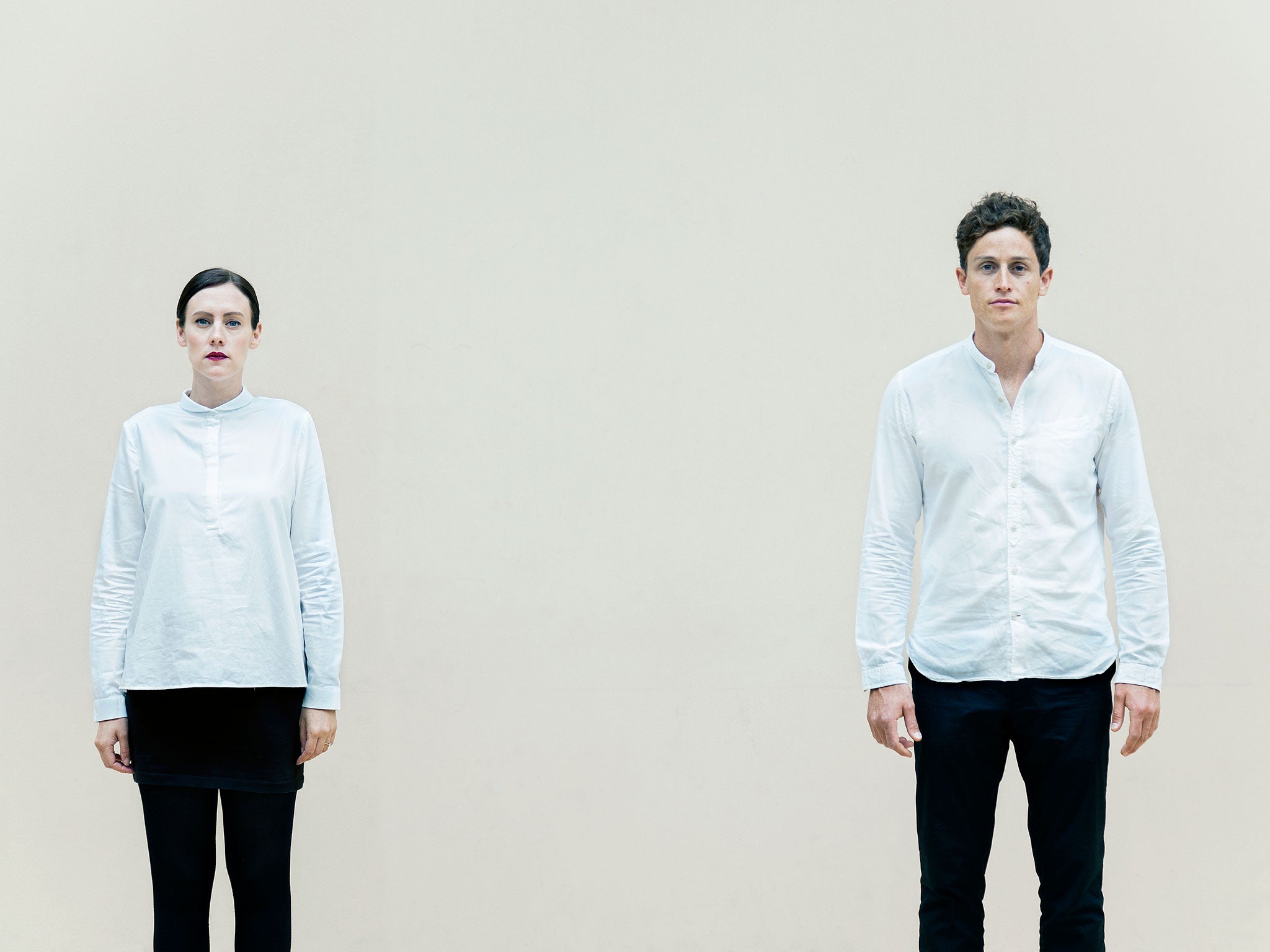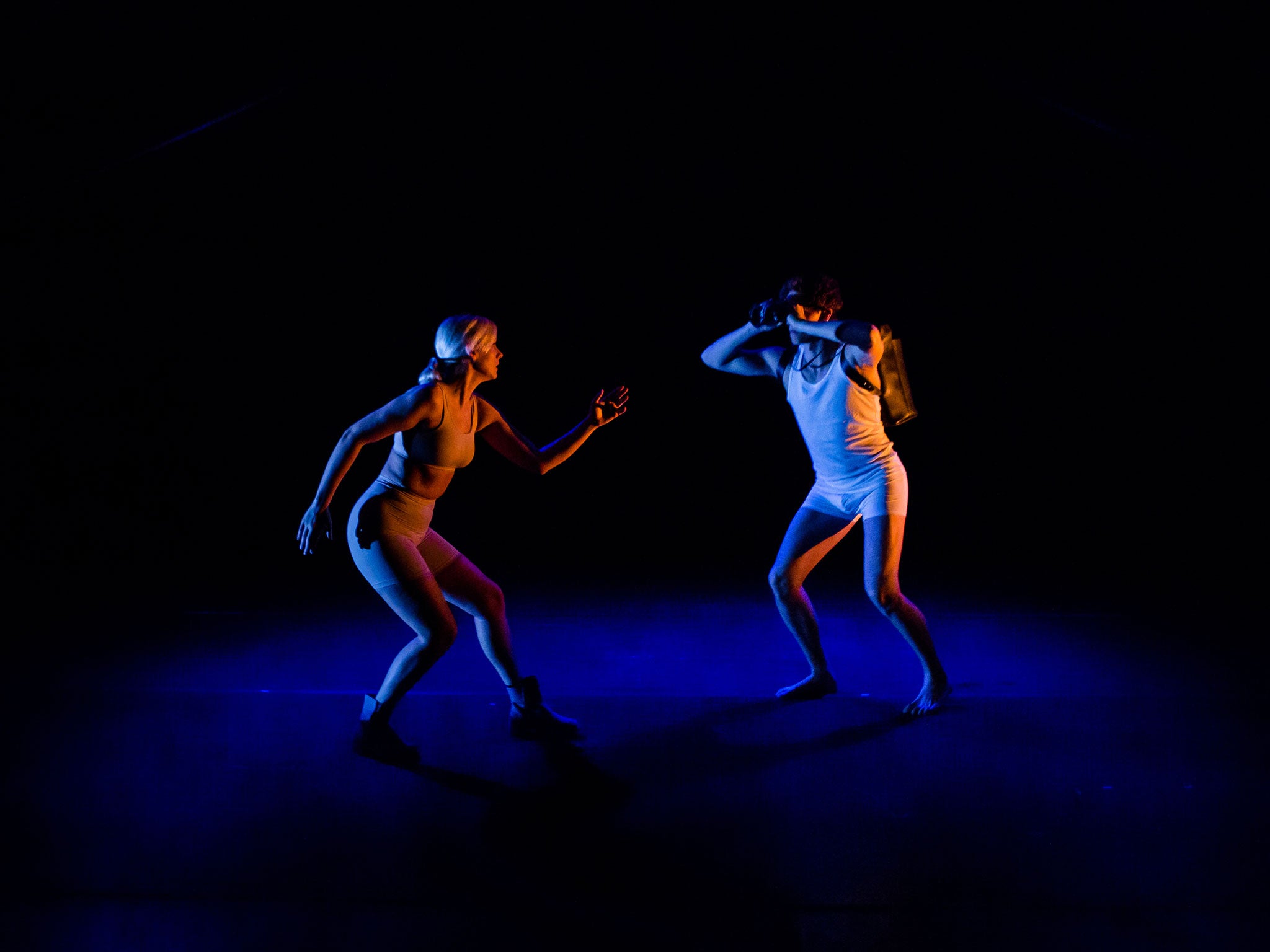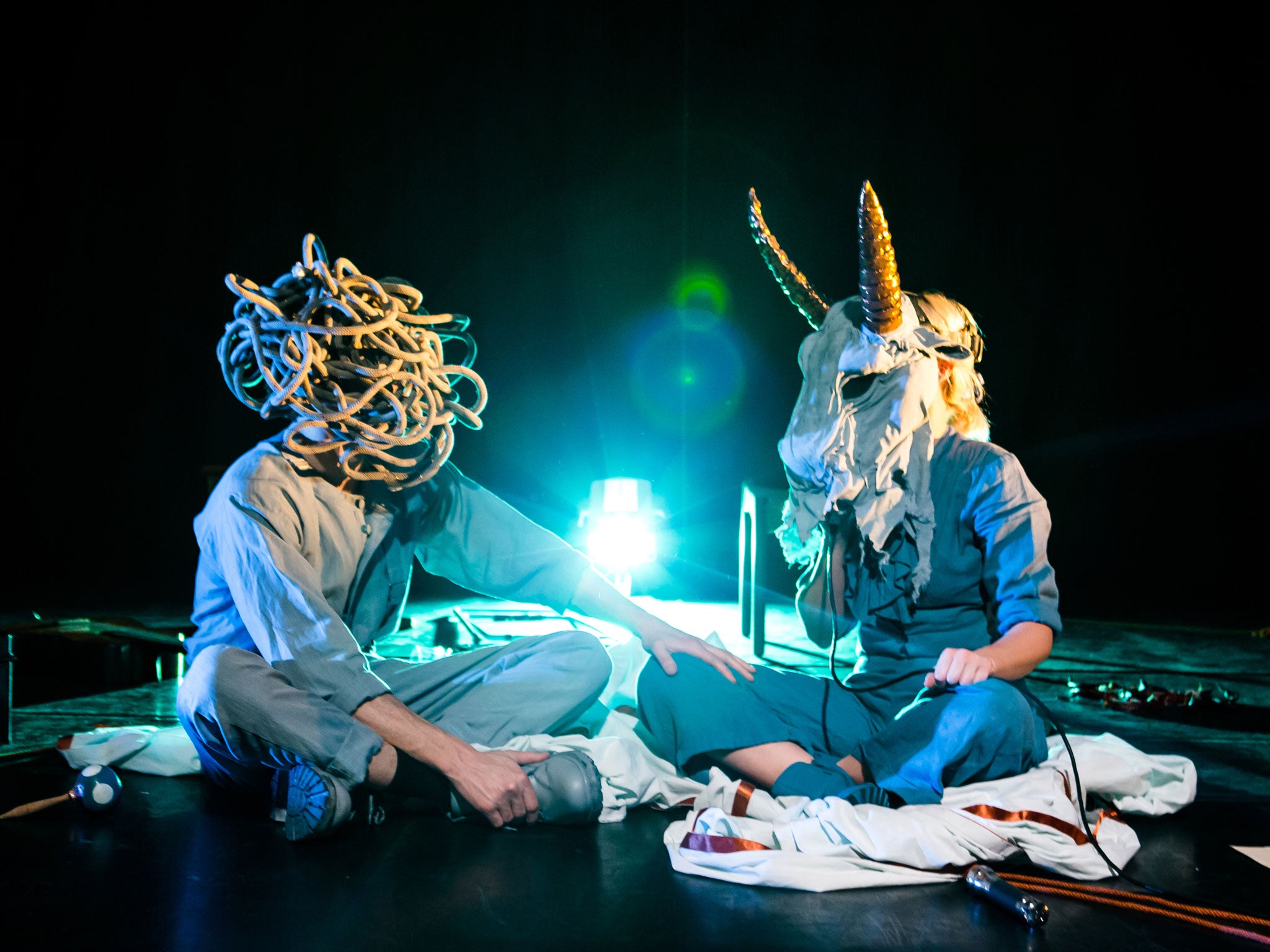Fake It 'Til You Make It: Bryony Kimmings has made a drama out of her boyfriend's depression
Bryony Kimmings met Tim Grayburn on a night out in 2013. Then, she discovered his secret: he had spent years hiding his severe depression. Here, the couple recall how they confronted his mental illness – and turned it into a hit stage show

My name is Bryony Kimmings, I am a performance artist from London. I met Tim in June 2013. I had been hidden away in a massive country house in the Yorkshire Dales for weeks, desperately making a show for Edinburgh. Walks, healthy food and long days of writing, going a little stir-crazy.
I found myself back in London on a boiling-hot weekend. I felt like a new butterfly. My friend was working at a local bar, so me and my ladies went out to drink gin. By 10pm, Lindsey, my designated winglady, was engrossed with a man called Joe and I was dancing. I remember screeching at Joe that he needed to find someone for me to have sex with. He fired out a text and along came Tim. All freckles and tan. He must have thought I was bonkers.
He says that he fancied me the moment he saw me, but I can't remember much more than us all dancing down the road. When I woke up the next morning I realised I had struck gold. Tim was such a gent and had the most gorgeous voice I had ever heard. We hung out all day and by the evening I was smitten.
Tim was the opposite of me in terms of lifestyle: he worked in advertising and spent his days lunching with men in suits, while I rolled around on studio floors and worked late into the night making music. He was a 9-5 man and I was forever on tour. But the businessman was a guy who expressed how much respect he had for his sisters and mother and how much he cared about the planet… I knew that he had a feminist heart and, for me, this was all that mattered.

After two months, Tim moved in. It didn't feel reckless or silly, just right. He unpacked his stuff into my tiny loft room in Clapton, in north-east London, and we split the paltry £350 rent. That summer was paradise. But when I got back from Edinburgh and winter began to come on, everything changed.
One day, in a rush to get into town, I grabbed Tim's backpack to use for some heavy books and found several packets of Citalopram, a strong form of antidepressants I recognised from a family member's use. I was so shocked. I remember sitting down on the edge of the bed and bursting into tears. I knew Tim was in a big meeting with a newspaper all day, so I sent him a distraught email, asking him to call me. As I waited for him to come home, I remember feeling like my bones were somehow sticking out of my body, totally broken.
What transpired was not at all what I expected. I waited patiently on our bed, trying my best to remain level-headed. I will never forget his face as he came through the door: he looked so broken. I remember us hugging for a very long time. It was very emotional. We lay on the bed staring at each other and started right from the beginning of the story. I had imagined he had been on the tablets for a little while and he had not told me because he felt embarrassed.
But what unfurled was a horrendous, year-long breakdown at the age of 22 – and nearly a decade of lying, self-medicating and denial, with suicidal episodes. I felt so much sadness for Tim and an overwhelming feeling of wanting to rescue him from his heavy shame that was so misplaced. I had seen members of my family heavy under the weight of mental illness; I knew full well that it was a disease – not something that reflected a weakness in someone's personality.

I was, of course, rattled by the seismic shift in our relationship, but I knew that I would never leave Tim. His honesty and vulnerability made me love him so much more. Our relationship went from romantic and idyllic to deep and profound.
What followed was a period of coming out. Tim told his work about his struggles with mental illness, and he told his friends and his family. He was met with nothing but kindness and respect. It transpired that other men he knew had also been struggling silently with poor mental health. I read a lot, tooling up; I wanted to know what we were in for as Tim made the decision to gradually reduce his dose of Citalopram. I waited patiently to see who the man I loved was underneath the haze of drugs.
The first few months were hopeful; he seemed happier. But he was also a lot more sensitive to the world around him and sometimes irritable that he felt powerless in it. That winter was a struggle, but it wasn't until about seven months later that the world caved in.
I was on tour in Australia during spring 2014. Tim had been feeling increasingly unwell. He was fatigued, and had terrible headaches and an awful insomnia, all of which we now know are early onset signs of his depression. We put it down to a combination of winter blues and chemical readjustments.
Three weeks in, Tim had a massive breakdown. He was wandering around central London in a daze until he eventually made it home. k I managed to Skype him at his parents' house and he looked like a shell of a man. He cried and said he had been thinking about death a lot and staring at our bedroom window, imagining his body hanging from it. It was devastating. He went to the doctor and got a very high dose of tablets; I know he felt a failure, but we needed a quick fix to save him and thankfully it worked. Three weeks later he was feeling a bit more like himself.
When I returned, I felt like I never wanted to be away again. I told him I wanted to give up touring, or otherwise he would have to make a show with me. He said, "I know about two things in this world, advertising and mental illness." I told him a show about advertising would be the worst, but a show about why men hide their depression would be infinitely excellent. He agreed he could use a break and that he would love to tour with me.

Making the show was a revelation for both of us. It was difficult to organise: in order for Tim to give up his salary, I had to have gigs and development funds sorted before we even set foot in the studio. I was used to working with non- artists, having made a show with my nine-year-old niece, but this was much harder. It was a sensitive subject and Tim had never been on stage. He was wooden, nervy and gangly. But it quickly transpired that this was the joy of the project; that he was just an ordinary guy trying his best to muddle through. He learnt to dance, to play the guitar. It was magical.
I never wanted to put words into his mouth, so the show revolved around a series of candid interviews we made in our living room, where he felt most comfortable being honest. He laid down some rules. The most important one was that he never wanted to have to look the audience in the eye; so we created a series of elaborate head coverings that represented different periods of his story. He exists behind these masks for nearly all of the show, until the finale. It was such a beautiful rule because it so accurately summarised his history.
We have toured our show across Australia thus far, and the response has been overwhelming. It's a modern love story, our lives laid bare, brutally honest. Our main aim was to make it as entertaining and funny as possible. We have had so many emails from people connecting with us and sharing stories.
I am five months' pregnant now, and spending our days together is heavenly. We are currently prepping to tour the UK for a few months and will do so again in spring after the baby is born. Tim is on a low dose of tablets at the moment and doing really well.
We know our lives will always be affected by mental illness. We talk every day and have both resolved to always be activists in mental-health awareness. Tim to me represents true love incarnate – something way deeper than I could have ever imagined when I went out to drink gin that night.
Tim's Story
When Bryony found those little tablets in my bag two years ago it felt like I had been found out. I didn't want her to know that I needed a tablet to stop me from constantly crying. All she needed to know was that I was the happy, fun and reckless laugh I thought she fancied. It certainly beat the scared, tired, teary, confused, suicidal, hopeless, angry me. Now there was no going back. She wanted to know everything.

I was 22 when I woke up one morning and tears just fell and I didn't know why. I began a spiral into sadness. I couldn't sleep, I just kept crying; I felt physically deflated and didn't feel myself at all. After six months I had my first suicidal thought. Code red: time to go to the family GP. After a few weeks of taking Citalopram, the old me came back: I stopped crying and I enjoyed the things I used to enjoy. Then began eight years of secretly taking the tablets without anyone other than my parents knowing.
That night, Bryony was like a curious medical student analysing every word of my confession. To my surprise, this secret of mine made her love me even more. My openness, the complexity of my emotions and the vulnerability of my well-being – she told me that being a man to her was all of this, as well as being able to knock up a couple of shelves.
This was the start of coming to terms with my illness. I had used the old food-poisoning excuse at work too many times when I had attempted to come off the tablets or when the depression had intensified. I was ready to find out exactly what was wrong with my brain and face up to it.
Telling all to Bryony was the first step; not too bad. Telling my mates was next. This worried me because I thought I would be excluded from the "lads" part of a group of mates. Nothing changed – if anything, it gave us a licence to talk about our problems. I don't know how we thought for so long that none of us had any issues. Another stupid blokey thing. It transpired that a couple of us had mental-health problems.
I'd made the decision to come off my anti-depressants a couple of times. I was 26 the first time I tried. I was doing well at work and having the time of my life in London: I couldn't have been happier. I thought I didn't need the tablets any more. Naively, I came off them cold turkey; after three weeks, everything came crashing down on top of me. I went straight back on the tablets.
The second time was four years later. With Bryony by my side, we planned it meticulously, by the book. I changed my diet and stopped drinking and doing all the things that could interfere with my recovery. I weened myself off the medication over a three-month period on the advice of doctors. It felt great: I was back.
Then, another three months later, the depression crept back. The experiment had failed, again. I was pretending it was working for too long, and let my decline develop until I couldn't take it any more. Bryony was in Australia on tour, which didn't help; I didn't have my home doctor who had been by my side all the way through. It hit me hard and I had a breakdown. Within a few days, I was back on the tablets.
It was around this time I realised I just wasn't up to my job – and I needed time to figure this all out. I told my boss, who was supportive, and probably relieved to be spared another dodgy-chicken dinner story to account for my absences. Still, I was a bit scared. I had worked in advertising for eight years, things were going well and I was due a promotion. But I knew that this was something I needed to do – the job could wait.

All of these reactions led Bryony and I to discuss the idea of telling all who wanted to listen about the damage caused by concealing a mental illness – a problem male sufferers are particularly prone to. I'd had the hardest discussions, with family, girlfriend, friends and colleagues, already, so it didn't really matter who else knew.
The idea of making a theatre show was exciting and terrifying. I was a nervous wreck even putting on a PowerPoint presentation to a few colleagues – now I had to get my head around talking about crying in cubicles to 250 strangers every night. It took a while to realise this was what I had agreed to do, but because I had that encouragement from Bryony, I trusted her to make it good. We wanted it to be completely honest, with no theatrical thrills. Depression could have killed me, and it has killed millions, so we had to be sensitive. It had to be raw or I wouldn't have felt like I could do it. It was a big job.
I looked back to when I was 21 and wasn't depressed – and I had to admit that I probably didn't believe the illness existed myself. I thought it was just for people who couldn't hack it. A member of my family suffered for years, but as kids were weren't told about it. What a load of old rubbish. To research the show, I read everything I could get my hands on; I went to seminars run by people from the UN and loads of doctors who knew about the brain.
Then, suddenly, we were at the Edinburgh Fringe with a work-in-progress show. It was August 2014, the first time I'd ever been on stage. I froze; I forgot everything I was supposed to say. Thankfully, I had my truly professional girlfriend next to me, who carried the show. People loved it. We had passed the test and it was time to really give it a go. We took Fake It 'Til You Make It to Australia and, by show 25, I had started to enjoy it a little, though I couldn't stop shaking.
The positive feedback is one of the best feelings I've ever had. I will never forget an email I got from a young lad who saw the show. He said that he'd been battling dark thoughts every day for a year; he was suicidal. He said that watching the show made him do something about it – go and see a doctor.
I've made more progress during this incredible year with regards to my mental health than I did in the eight years keeping it a secret. I'm not bowling around pretending I've got nothing wrong with me. This is who I am. It has been a part of my life and now I like to think I'm getting better. I'm on a very low dose of medication and I reckon that in four months' time, I may not need it any more.
I haven't made my mind up about what I'm going to do when this is all over. I've always wanted to try screen-acting, but I've never had the confidence. But I also did enjoy my job and loved the people I worked with. I'll just have to see what happens. One thing I have realised is that you have to be a machine to be perfect. Our imperfections are part of who we are.
Bryony and Tim perform 'Fake It 'Til You Make It' at the Edinburgh Fringe Festival from 7 to 30 August, and at London's Soho Theatre from 22 September to 17 October. For details: bryonykimmings.com
Join our commenting forum
Join thought-provoking conversations, follow other Independent readers and see their replies
Comments